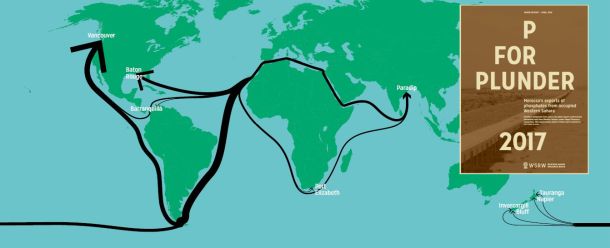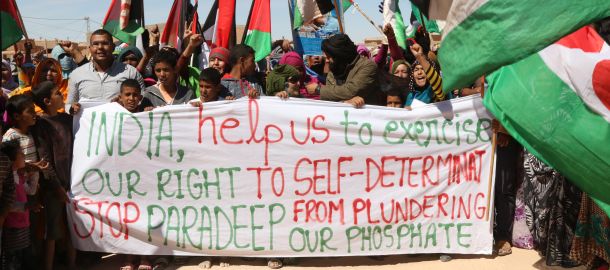
BASF, the German chemical company who imported Western Saharan phosphates early October, wrote that they "are fully confident that the operations of OCP at Boucraa and the purchase of the replacement delivery were consistent with international law". But after request from WSRW, they refuse to publish their “expert opinion” upon which their conclusion is based. To clarify further aspects of the unpublished report, they refer to a US law firm.
In October, the Belgian branch of Western Sahara Resource Watch discovered the illegal imports of Western Saharan phosphates by a Belgian subsidiary of German chemical company BASF.
WSRW, together with German former MEP, Mrs. Margot Kessler, urged BASF on 22nd of October to clarify their role. In their reply to our letter raising the illegality and controversy of such trade, BASF stated that this was an isolated import that would not be repeated again.
They however believed that the operations of their Moroccan business partner, the OCP, are beneficial to the local population of occupied Western Sahara, and are, strangely enough, in line with international law. This conclusion was based on what they refered to as an “expert opinion”.
Since BASF had not responded to any of the questions asked by WSRW, on 6 November 2008 a new letter was sent to BASF, where same questions were repeated. Simultaneously, WSRW demanded a copy of the so-called “expert-opinion”.
If anything, Western Sahara Resource Watch believes that the Moroccan economic activities in the occupied territories of Western Sahara have lead to the systematic marginalisation of the Sahrawi from the phosphate industry, as is clearly demonstrated by the France Libertés report of 2003. Read letter from WSRW to BASF below.
As to the remark of the legality of OCP’s operations, WSRW referred to the numerous UN resolutions and UN practice treating Western Sahara as a non-autonomous territory. The letter concludes that “given this status, any economic activity undertaken by an occupying power in disrespect of the wishes and interests of the local population, would consist in an infringement of international law. Since all evidence points to the fact that OCP’s operations in the area are neither according to the local population’s interests nor their wishes, we do not see how one can argue the consistency of OCP’s activities with international law."
Today WSRW received a reply from Mrs. Anne Forst of BASF, saying that “unfortunately, we [BASF] cannot provide you with a copy of the expert opinion we received from the OCP”. In stead, they called upon WSRW to contact the US based law firm Covington & Burling for further information.
Mail from Anne Forst, BASF, to international coordinator of WSRW, Cate Lewis
19 November 2008
Dear Ms. Lewis,
Thank you for providing us with the report by France Libertés/Foundation Danielle Mitterand. Please understand that due to competitive reasons we cannot answer your questions in great detail. BASF uses phosphate as a raw material for the production of fertilizers. The phosphate originated from Western Sahara received by OCP was an isolated replacement delivery from this territory.
Unfortunately, we cannot provide you with a copy of the expert opinion we received from OCP. However, the contact person for additional information on OCP's operations in the Western Sahara is Mr. Derek Ludwin, Covington & Burling LLP, Washington D.C.20004. E-Mail: dludwin@cov.com.
Kind Regards,
Anne Forst
Sustainability Center
Letter from Mr. Margot Keßler to Mrs. Anne Forst, BASF
6 November 2008
For the attention of Mrs. Anne Forst, Sustainability Center, BASF
Dear Mrs. Forst,
Thank you very much for your quick reply, dated 30 October 2008, to our letter soliciting a clarification regarding the BASF imports from the Bu Craa mines, occupied Western Sahara.
It shows that BASF treats this matter seriously, which is much appreciated. We’re also pleased to take note that the company does not expect to import from the occupied territories again. We understand from your letter that BASF will not use this illegal source in the future.
However, we would like to reiterate some of our questions, which we feel have yet to be answered.
• Are our sources correct in stating that the received volume was 25.000 tons?
• We understand from your letter that the Bu Craa import was an isolated case. Could you then confirm that this was the only time BASF has imported from the aforementioned mines during the last 5 years? If not, could you please specify previous imports by volume and date of receipt?
• In which plant is BASF processing the phosphates?
• And is the final product destined exclusively for Belgian markets? If not, which other markets?
We would like to stress again that it is not our intention to be a nuisance to BASF. Rather, we feel clarity is the best policy in controversial issues, such as importing from an illegally occupied territory.
In your letter, you refer to an expert opinion that would demonstrate the benefits of OCP’s operations in the occupied territories of Western Sahara. Could you be so kind as to provide us with a copy of this document?
The conclusions of the opinion you refer to seems to be in stark contrast with our sources such as the report of the France Libertés/Danielle Mitterrand Foundation, based on extensive field work which clearly demonstrates that Moroccan economic activities in the occupied area of Western Sahara are in no respect beneficial to the local population. Quite the opposite, since Saharawis have been systematically marginalised from the phosphate industry. The France Libertés mission met with 200 former Saharawi workers from the mines. All of them claimed having suffered various violations of their socio-economic rights. Regarding those who still work in the company, the report states that “[n]ot only have the Saharawi workers benefited very little if not at all, of any promotion, but they have mainly been subject to downgrading measures in the scale of the jobs they held, without any prior information, nor any reason.” We enclose a copy of the report, for your ease of reference.
Finally, we’d like to point to the numerous UN Resolutions and longstanding UN practice treating Western Sahara as a non-autonomous territory. Given this status, any economic activity undertaken by an occupying power in disrespect of the wishes and interests of the local population, would consist in an infringement of international law. Since all evidence points to the fact that OCP’s operations in the area are neither according to the local population’s interests nor their wishes, we do not see how one can argue the consistency of OCP’s activities with international law.
We also take the opportunity to send you a book in the mail, “International Law and the Question of Western Sahara”, published by the International Platform of Jurists for East Timor in 2007.
Looking forward to your reply,
Margot Keßler
Former Euro-Parliamentarian
Cate Lewis
International Coordinator
Western Sahara Resource Watch
http://www.wsrw.org
A reply can be sent to Cate Lewis at cate@wsrw.org
Attached:
- France Libertés/Danielle Mitterrand Foundation Report of the International Mission of
Inquiry in Western Sahara, November 2002.
New report: Western Sahara phosphate trade halved
The export of phosphate rock from occupied Western Sahara has never been lower than in 2019. This is revealed in the new WSRW report P for Plunder, published today.
New report on Western Sahara phosphate industry out now
Morocco shipped 1.93 million tonnes of phosphate out of occupied Western Sahara in 2018, worth an estimated $164 million, new report shows. Here is all you need to know about the volume, values, vessels and clients.
New report on contentious Western Sahara phosphate trade
Morocco shipped over 1.5 million tonnes of phosphate out of occupied Western Sahara in 2017, to the tune of over $142 million. But the number of international importers of the contentious conflict mineral is waning, WSRW's annual report shows.
New report on global phosphate trade from occupied Western Sahara
Over 200 million dollars worth of phosphate rock was shipped out of occupied Western Sahara last year, a new report from WSRW shows. For the first time, India is among the top importers.



